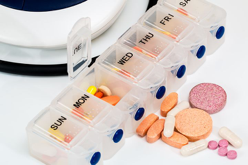This article is about drug toxicity, interactions and aging. I seem to write a lot of articles that involve aging, probably because I have considerable experience in this area. I’ve earned the extinguished title of “elderly”. Also, this article is pretty long, but give me a break, it covers 70 years of life.
I feel the need to mention that I worked in the pharmaceutical industry, both government and industry sides, for almost forty years. I enjoyed the work, the many fine people that I met along the way, and the knowledge that we worked together to find safe cures for serious diseases. So, please forgive me, as an extinguished elderly person, if I attempt to take a look at the lighter side of pharmaceuticals, drug toxicity, drug interactions and aging.
The human body is an amazing thing, an engine that actually gets stronger and lasts longer with continued use in the form of exercise. It’s like a perpetual motion machine that unfortunately comes with an expiration date. Of course, you need to add fuel, like a quarter pounder with cheese, fries and a diet coke from time to time. (I realize this probably isn’t the best of dietary recommendations, high cholesterol, salt content, carcinogens in the diet soda and such, but more on that later; think statins). In spite of this, as with all living things eventually chaos ensues, parts break down with age, and sometimes fall off. This is where pharmaceuticals can help to increase life expectancy, if you properly balance reward (efficacy) versus risk (toxicity and drug interactions).
Speaking of efficacy and toxicity, in my first graduate pharmacology class the professor said two things that stuck with me. First, if a drug has no toxicity, then it has no biological activity and thus no ability to treat disease. Second, when a new drug is approved by the FDA, prescribe it as often as possible before all the side effects are found. For some unknown reason, I finished my degree anyhow.
I would also like to mention that I chose to write this article focusing on age groups, and this requires some rather loose generalizations. For example, a teenager who chooses to smoke or vape can have the lungs of a fifty-year-old coal miner. A twenty-year-old who consumes large amounts of drugs and/or alcohol can have the liver of ninety-year-old, or worse. What I’m trying to say is, for each age group I’m assuming that the person has acted in a manner reasonably consistent with maintaining good health. I also may exaggerate for effect from time to time.
I’m going to discuss this subject in terms of Patient X, a male-type person, since I’m male and therefore know more about male stuff. If I tried to discuss this terms of female stuff, some people, like my wife, would probably want to hurt me.
Say Patient X starts out as a baby, and given the blessing of good health, love and nurturing grows rapidly into a young child. As a baby, you probably are depriving your parents of much needed sleep and time for exercise, unintentionally shortening their expiration date. Hopefully no medicinal drugs are required as an infant, although in the old days when dinosaurs roamed the earth, my mother might possibly have slipped my sister and me a drop or two of whiskey, or what she fondly referred to as “sleepy juice” (see lack of parental sleep above). I am in no way recommending this; just a bit of useless history to put into your vast space of unnecessary knowledge.
As we got older, Mom replaced that drop or two of alcohol with Dimetapp, the new “sleepy juice.” Thanks to my mother, and others like her, the Dimetapp bottle now includes a warning for drug toxicity that states something to the effect “do not use this medication to put your kid to sleep, no matter how psychotic you feel due to sleep deprivation.” I will wisely avoid discussing any risk assessment in this regard. Let’s just say that some lions eat their young, although to my knowledge it’s never been shown to be due to lack of sleep.
As a young child, Patient X’s body virtually explodes with energy, which can further shorten the parents’ expiration date as they chase him around, futilely trying to keep him safe. At this age, there may be a vaccination or two required in addition to more “sleepy juice” (Dimetapp), actually valid for colds and allergies, and an occasional antibiotic for a bacterial infection. As anyone who’s ever been a parent knows, small children are walking incubators of viral and bacterial disease, such as the common cold, influenza, measles, mumps, chicken pox, pink eye, strep throat and others. If the parents catch one of these, this can even further shorten their expiration date. But not much drug toxicity to worry about at this age.
TEENS AND TWENTIES
In the teens and twenties, it’s a well-known conclusion that a person is invulnerable. Just look at the crazy things kids do in that age group. This group lives fast, runs fast, eats massive amounts of junk food, or alternatively spends endless hours sitting on their butts playing video games, as in no exercise at all for that perpetual motion machine.
They also drive fast, text while driving, eat while driving, put on make-up while driving, have sex while driving, do pretty much anything but drive while driving. Then there’s the consumption of copious amounts of illicit drugs and alcohol (high school and college) and participation in such extreme sports as bungee jumping, sky diving, snowboarding, kitesurfing in shark infested waters, street racing, car hood surfing (I made this one up; please don’t try it at home). You name it, and at this age someone will try it. Drug toxicity is the furthest thing from their minds.
Assuming reasonably good health, in this age group Patient X will mostly require treatment for broken bones. There is some drug or alcohol abuse and perhaps an occasional case of diabetes for those (not Patient X; he’s smarter than this) that do nothing but sit, eat junk food, play video games, and live their entire lives on social media while their pancreas goes into overdrive and eventually give up the fight. This often requires monitoring the blood sugar and taking insulin.
So far, there’s not a lot of risk involved in the drugs mentioned. The safety of most antibiotics is well-established; they can cause some seriously uncomfortable G.I. issues if they kill all the healthy bacteria in your gut. This is one of the drug groups that has had a significant effect on saving human lives and increasing life-expectancy. Sleepy juice (Dimetapp), containing antihistamines, is great for head colds and allergies, and the drug toxicity is minimal if given as prescribed.
THIRTIES
This gets us to the thirties, where things begin to get interesting for Patient X. Routine checkups include blood chemistries and liver and lipids. In my case (I’m not Patient X, just a good example here; sorry for the confusion), my cholesterol blasted off like a rocket ship to Mars. It seems my mother had hereditary high cholesterol (and all those cheeseburgers, fries and milk shakes probably didn’t help). Here enters another of the drugs that can increase life expectancy considerably. At this point I had a choice, either give up red meat (again, cheese burgers, steak, Philly cheese steaks, pizza, etc.) and my favorite, fried chicken (love me some Popeye’s) or take a single pill a day, a drug called a statin.
Statins act on the liver to block an enzyme that produces the deadly cholesterol, that blocks arteries and can cause heart attack and stroke. As with most things in life, this gets more complicated; there’s good cholesterol, bad cholesterol, and perhaps indifferent cholesterol? Since my cholesterol level was headed for the 300+ range, I opted for the daily pill rather than giving up all that yummy greasy food. The doctor at the time assured me this was definitely not indifferent cholesterol, but the artery-blocking kind.
Since this article is supposed to be about drug toxicity and interactions, perhaps I should mention that statins do come with some known toxicity, also called side effects. These include headache, difficulty sleeping, flushing of the skin, muscle aches, dizziness, drowsiness, nausea, vomiting, diarrhea and rash. Serious side effects can include extreme muscle inflammation and kidney damage. In my case, the doctor prescribed the statin Lipitor first, but after a couple of weeks I felt like jumping out of my skin. My wife pointed out that it was not normal for me to run around the house in circles until I collapsed from exhaustion, and I was scaring the children. I ended up on Zocor for life, only mildly agitated.
So in our thirties, there’s already a life-saving drug available, complete with some drug toxicity. Keep in mind that many of these side effects occur infrequently, and Patient X (note we’re back to Patient X) is probably okay with the proper monitoring. Often worth the risk to avoid heart attack and stroke. There are lots of other things that can go wrong at this age; anywhere from diabetes to early cardiovascular problems to some cancers, albeit infrequent. However, for the most part, and due to the fact that I want you to finish reading this article today, I’ll move on to the forties.
FORTIES
I did a quick literature search on what kinds of illnesses Patient X can look forward to in his forties. The results surprised me; overactive bladder, peri-menopausal symptoms (Patient X dodged a bullet here), kidney stones, urinary tract and prostate infections, food allergies, osteoarthritis, hypertension, ED (oh goodie), skin cancer and depression or anxiety. That’s quite a list. Based on my own experience (I can’t speak for Patient X here), while not a strictly organic disease, I need to add the non-technical term “midlife crisis” to this list.
Midlife crisis has nothing to do with drug toxicity. This is where you’re married with children, both you and the wife work, you haven’t seen each other for several years without the children, and barely recognize each other. You pay to fly grandma in to watch the children for the weekend, head out to a high-end hotel Friday night, sexy nighties and thoughts of depravity and end up sleeping through soundly until late Sunday afternoon. It can also include obsessive thoughts of buying a Harley and heading west, or east if you’re on the left coast. Unfortunately, there’s no pill I am aware of to treat this particular affliction.
Let’s just give Patient X a couple of these illnesses, again for sake of brevity. Hypertension is fairly common, probably more so at the moment, what with Covid-19, rioting and being quarantined at home with the kids. There are several different drug classes used to treat hypertension, and each class has a number of specific drugs. The doctor will probably prescribe a diuretic first for Patient X.
A diuretic increases the amount of urine that you produce, causing X (we’ll use his nickname since we’re getting better acquainted) to pee more and decrease the amount of fluid (salt and water) in his vasculature, thus reducing the pressure. These can work with mild hypertension, and come with common side effects of constipation, dizziness, dry mouth, headaches, stomach upset and muscle cramps, to name a few. Not to mention the need to pee more, often in the middle of the night (poor X, even less sleepy time). Damn drug toxicity!
Then there are the alpha blockers and ACE inhibitors. The alpha blockers will cause X’s blood vessels to relax, reducing the pressure. These include the side effects of headaches, nausea, swollen ankles, sleep disturbance (even less sleepy time for X), tremors and possible problems with erections. ED is already a fairly common issue in the forties, and if you add alpha blockers, I’m feeling sadder and sadder for poor old X. I’d have tremors with this drug toxicity too.
The ACE inhibitors prevent the body from making an enzyme that tells X’s blood vessels to contract/tighten, thus also reducing the pressure. Side effects include cough, red, itchy skin, dizziness or fainting when X stands up, swelling of neck, face and tongue and kidney failure (ACE inhibitors act through the kidney). X will be happy to know there’s no ED, but fainting and kidney failure are no picnic.
You should begin to see a pattern here. X is only on a couple of major drugs that can increase life-expectancy, and already there’s quite an accumulation of drug toxicity. These include problems sleeping, swelling of various parts (except for the ED and failure to get an erection thing), fainting and kidney issues (either too much peeing or kidney failure). He’s only forty, and already X probably feels like just staying in bed alone all day, since he’s going to want to sleep a lot, he keeps passing out whenever he stands up, the wrong parts are swelling and he might as well be alone since the one part that he wants to swell is apparently also asleep. Poor X.
FIFTIES
As much as I hate to do it, let’s move on to the fifties. In his fifties, X will probably experience muscle limitations (tight, less flexible muscles), water shortage, lower testosterone (sorry X) and mental instability (depression, anxiety, memory loss). This also may include dry, wrinkled skin, lowered metabolism (no more eating), the beginnings of heart disease (oh goodie), lowered immunity, and arthritis.
There is some hope for X in the ED department in the form of Viagra, although this comes with everything from headache to heart issues. Viagra plus nitrates can result in a dramatic drop in blood pressure, leading to a heart attack. To sex, or not to sex, a heart attack is the question? For the sake of this article, let’s give X a deep venous thrombosis that goes to a pulmonary embolism (PE) (possibly due to a long flight during a business trip), arthritis and anxiety (understandable, what with a heart problem, no sex, and up peeing all night).
The treatment for the blood clot and PE would be blood thinners, either the ever popular rat poison (I mean Coumadin) or one of the newer ones like Eliquis. Drug toxicity includes bleeding issues, such as heavy bruising, potential for internal bleeds, and the like. Drug interactions include the inability to take non-steroidal anti-inflammatory drugs (NSAIDS) or drink alcohol (again, poor X) because they can further thin the blood. If the blood thinner is Coumadin, you also can’t eat a lot of veggies with Vitamin K, because these promote clotting.
The treatment for arthritis often includes NSAIDS, such as Ibuprofen. But, if poor X is taking a blood thinner, he can’t take NSAIDS, so he has to endure the arthritic pain. He also can’t drink alcohol to help with the anxiety, which isn’t a good idea anyhow because it can lead to alcoholism. There’s Xanax, a benzodiazepine for treatment of anxiety, which can lead to memory loss, and poor X is already having problems with this due to his age (now fifty). Some antibiotics also interact with blood thinners, especially Coumadin, decreasing Coumadin metabolism and increase blood thinning, so X better not get a bacterial infection or bacterial pneumonia. Drug toxicity and interactions make life interesting.
God help X if he also has something like a G.I. bleed such as a bleeding ulcer, not uncommon in someone filled with anxiety. If he’s on a blood thinner, he might bleed to death because his ulcer will bleed a lot without his blood clotting. If the doc takes him off the blood thinner to treat the ulcer, the blood clots might come back and kill him. The doc is likely to prescribe something like a PPI (proton-pump-inhibitor, example Nexium) to treat the ulcer by significantly reducing production of stomach acid. Side effects of PPI’s include headache, diarrhea, nausea, abdominal pain, potential kidney damage and formation of polyps in the fundus of the stomach with long-term use. Then there’s still the side effects from the statin (for high cholesterol) and the diuretic or ACE inhibitor (for hypertension).
So at this point poor X is peeing too much, and bleeding too much, and not sleeping enough, and his ankles are swollen, and his leg(s) are probably swollen from the blood clot(s). Important parts refuse to swell, he’s probably not eating much because of GI symptoms, and his memory isn’t all that great, which is good, because that means he’s probably forgotten about sex completely. He’s only fifty, and already he’s having lots of problems, and he’s not sure which ones are due to disease and which ones are due to drug toxicity and interactions.
SIXTIES
I want to stop here, because I’m feeling terrible for X at this point. But, for the sake of argument, let’s move on to the sixties (please forgive me X, old buddy). We have a veritable smorgasbord of illnesses to choose from, including cancer, hearing loss, weight creep (the body makes its own calories at this point, no more need for food), heart, memory and vision problems. That high blood pressure that we talked about earlier can lead to damaged arteries resulting in heart problems, kidney damage, brain damage, and you guessed it X, good old ED.
Let’s go easy on X, and just give him a heart problem, say congestive heart failure. This can happen from long-term high blood pressure that weakens the heart, so that it doesn’t pump blood as efficiently. Congestive heart failure can also cause the kidneys to retain salt and water, fluid to back up in the lungs, and the ankles and feet to swell.
The treatments for congestive heart failure include those ACE inhibitors again, to reduce pressure in the vasculature, diuretics to make you pee more and get rid of that excess fluid retention, and beta blockers. We’ve already discussed drug toxicity of ACE inhibitors and diuretics. The beta blockers are drugs that cause your heart to beat more slowly and with less force, lowering your blood pressure and reducing the strain on your heart. The side effects of beta blockers include fatigue and dizziness, poor circulation, upset stomach, nausea, diarrhea, and wait for it X…sexual dysfunction.
So at this point X is peeing too much, not sleeping (anxiety, peeing at night, fretting about sex he can’t have, excitation from the Zocor), ankles, legs and feet swelling, dizzy when he stands up, sits down, or stands on his head, heart beating more slowly, sex is off the table completely. He doesn’t remember the last time he had sex, and he’s terrified he’s going to have a heart attack.
This results in the need for extra Xanax, which screws up the memory even more. The good news is that the blood thinner may have prevented clotting that could have caused a heart attack and the Zocor has kept that cholesterol low and those stiff coronary arteries (from hypertension) free of artery-clogging cholesterol. So there’s that. Many of these drugs act through the liver, or are cleared by it, and they also affect the kidney. So there can be liver and kidney damage, from either the aforementioned diseases or drug toxicity. It’s very difficult to tell which might be the case.
At this point X is taking Zocor (cholesterol), a diuretic or ACE inhibitor (hypertension), an occasional Viagra (erectile dysfunction), blood thinners (blood clot/PE), Nexium (ulcers), beta blocker (congestive heart failure), Xanax (anxiety), and an occasional antibiotic. Each comes with its own drug toxicity and drug interactions.
By age 60, X is probably also taking various vitamins and dietary/herbal supplements. I won’t go into these specifically, because there are so many. Just keep in mind that many of these are not regulated by the FDA and contain serious pharmacologically active substances in uncontrolled dosages. Examples of such active substances include atropine (increases heart rate), vincristine (used as a cancer drug), digoxin (heart effects), and phenols (anti-viral properties), to name a few. These can all interact with prescription drugs, and the herbal dosages are not controlled.
SEVENTIES
On to the seventies (sorry X). At this age, X might expect dementia, Alzheimer’s, problems with electrical conductivity in the heart (irregular heartbeat, arrhythmias), osteoporosis, insomnia, weakened immunity, GI issues (ulcers, constipation), weak or overactive bladder, prostate problems, various sexual dysfunctions, vision and hearing problems and arthritis. Let’s go easy on X, and just give him COPD (he’s a smoker) and rheumatoid arthritis.
Treatments for COPD include bronchodilators (relax airways) such as Albuterol, inhaled steroids and phosphodiesterase-4 (PDE-4) inhibitors (roflumilast) that reduce airway inflammation. Drug toxicity of inhaled steroids include bruising, hoarseness and oral infections. PDE-4 inhibitors can cause diarrhea and weight loss. So the steroids can cause immunosuppression and increased oral infections at an age where your immune system is already giving up, and the other drugs cause diarrhea; seems like most every drug causes this, and the more you take the more you get? Now poor X is not just in the bathroom peeing himself to death.
Rheumatoid arthritis is a tough one for poor old X, especially if he’s on blood thinners and can’t take NSAIDs. There is the biopharmaceutical HUMIRA (adalimumab). This biologic blocks the inflammatory cytokine TNF-alpha that is thought to contribute to rheumatoid arthritis. While there’s probably no direct drug interactions between HUMIRA and blood thinners, HUMIRA is a strong immunosuppressant. Poor X is already immunosuppressed by advanced age and steroids, and HUMIRA is also a strong immunosuppressant. With this drug regimen and drug toxicity he might want to live in a bubble to avoid contact with infectious agents. He’s the perfect target for…say…Covid-19. Run away X, run away!
Finally, (thank God, says both the reader and X), there’s X’s liver. I’m sure you all know that heavy drinking can damage the liver. What you might not know is that many of these drugs are metabolized by specific enzymes in the liver. One of the major drug-drug interactions involves the same liver enzyme acting to metabolize both drugs. When this is the case, one or both of those drugs can be metabolized more slowly, thus increasing their blood concentration, potency and time of activity.
If you have too many drugs on board at high doses that act through the liver, drug interactions can damage the liver. There are some drugs with drug toxicity that acts directly to destroy the liver. Coumadin, the blood thinner, is one drug that acts through the liver, and if you drink alcohol while on Coumadin you can both destroy the liver and end up bleeding to death (don’t do it, X). Zocor, the anti-cholesterol medicine, can also cause liver damage. So X, keep an eye on those liver enzymes.
I don’t have the heart (or the time) to go into the eighties, and I’m sure X is grateful for that. As you can see in this one example, in his 70’s Patient X is taking on the order of a dozen prescription drugs. This is in addition to God knows how many vitamin and herbal supplements, all with their own drug toxicity and drug interactions. It is important to tell your doctor and pharmacist all of the medications, herbals and vitamins that you are taking, especially when they plan to prescribe a new one. They can help you with the more obvious drug toxicity and drug interactions. However, the knowledge of all the side effects and interactions when a patient is taking several different medications and herbals at once just isn’t available; there are limits.
On a more personal note, several years ago my younger sister sent me a list of over 20 prescription drugs that my 65-year-old mother was taking daily and asked me to figure out the side effects and drug interactions involved. My mother was in poor health, and my sister suspected it might be more about the twenty prescription drugs than anything. My sister was a smart lady. Unfortunately, after working on this analysis for an hour or so it became apparent to me that this was an exercise in futility. There was absolutely no way to distinguish between the symptoms related to actual diseases, the side effects of those 20 drugs and the effects of any drug interactions. I had to tell this to my sister. I was sad.
Now that I’ve gotten this far into this article, I’m not sure what point I’m trying to make. One conclusion is that in a society where medical treatment involves mainly prescription drugs, and some effective surgeries, as you age and things go wrong you’re likely to end up on several different medications. At some point, the line between natural disease, symptoms due to drug toxicity and drug interactions probably blurs. And yet, many of these drugs such as antibiotics, statins, heart drugs, GI drugs and even blood thinners can extend life expectancy significantly. Until something better comes along, I guess we’ll just have to muddle through the best we can. (Keep in mind that I was kind to Patient X, and didn’t give him any form of cancer, which is a whole other ball game).
From a personal perspective, I’m 69 years old and currently am lucky, only taking 4 daily prescription drugs. However, I’m already noticing some problems, in that I sometimes have trouble remembering to take the meds on time each day. I don’t know if this is memory loss due to aging, drug toxicity, drug interactions or the fact that I’m easily distracted (Ooh, a puppy!). It probably has nothing to do with sex, since aging and pretty much every disease and drug mentioned above either causes ED, lowers testosterone or makes you forget about it. I’m thinking the best solution is for someone to invent a better pill box, perhaps one with its own built-in alarm that sounds when it’s time to pop another pill, or two, or three, or ten. Oh God! Aging is not for the faint of heart, although I’m pretty sure there’s a pill for that too.
If you enjoyed this article, you might like my book PLEASURIA: TAKE AS DIRECTED, a comedy murder mystery now available for only $0.99 on Amazon at http://bit.ly/pleasuria





